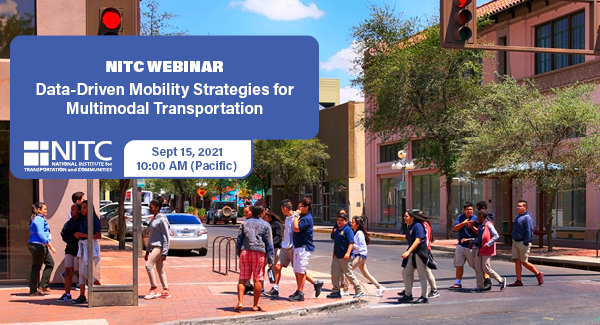Please join the Portland State University Intelligent Transportation Lab and the Oregon Transportation Research and Education Consortium as we host a Transportation Research Board webinar on climate change mitigation and adaptation, followed by an informal discussion on climate change transportation impacts and planning in the Pacific Northwest. This webinar will explore the findings of Transportation Research Board Special Report 299: A Transportation Research Program for Mitigating and Adapting to Climate Change and Conserving Energy. Committee chair, Michael Meyer, will provide an overview of the research programs recommended by the committee that can be used to develop guidance to policy makers. When: Wednesday, December 2, 2009 Where: Portland State University Intelligent Transportation System Lab 1930 SW 4th Ave, Room 315 Time: 11 am - 12:45 pm
Portland State University faculty and students presented their work at the National Urban Freight Conference (NUFC) in Long Beach, CA October 21-23, 2009. Dr. Miguel Figliozzi presented "Emissions & Energy Minimization Vehicle Routing Problem" and "A Study of Transportation Disruption Causes and Cost in Containerized Maritime Transportation." Also, graduate research assistants Ryan Conrad and Nikki Wheeler presented research projects sponsored by OTREC. Ryan presented "Algorithms and Methodologies to Analyze and Quantify the Impacts of Congestion on Urban Distribution Systems Using Real-world Urban Network Data" and Nikki presented "Analysis of the Impacts of Congestion on Freight Movements in the Portland Metropolitan Area." NUFC brings together researchers and practitioners in the public and private sectors from many disciplines within freight transportation. This conference is the only one of its kind in the US, and brought attendees and presenters from across the US, Canada and Europe.
PRESENTATION ARCHIVE
OVERVIEW
Multimodal transportation systems (e.g., walking, cycling, automobile, public transit, etc.) are effective in increasing people’s travel flexibility, reducing congestion, and improving safety. Therefore, it is critical to understand what factors would affect people’s mode choices. With advanced technology, such as connected and automated vehicles, cities are now facing a transition from traditional urban planning to developing smart cities. To support multimodal transportation management, this study serves as a bridge to connect speed management strategies of conventional corridors to connected vehicle corridors.
The study consists of three main components. In the first component, the impact of speed management strategies along traditional corridors was evaluated. In the second component, the impacts of the specific speed management strategies, signal retiming and...
Read moreWatch video
View slides: Bell Presentation (PDF)
Summaries:
Identification and Characterization of PM2.5 and VOC Hot Spots on Arterial Corridor by Integrating Probe Vehicle, Traffic, and Land Use Data: The purpose of this study is to explore the use of integrated probe vehicle, traffic and land use data to identify and characterize fine particulate matter (PM2.5) and volatile organic compound (VOC) hot spot locations on urban arterial corridors. An emission hot spot is defined as a fixed location along a corridor in which the mean pollutant concentrations are consistently above the 85th percentile of pollutant concentrations when considering all other locations along the corridor during the same time period. In order to collect data for this study, an electric vehicle was equipped with instruments designed to measure PM2.5 and VOC concentrations. Second-by-second measurements were performed for each pollutant from both the right and left sides of the vehicle. Detailed meteorological, traffic and land use data is also...
Watch video
View slides
Summary: Although the running of red lights is perceived by motorists as a commonplace behavior for cyclists, little research has been done on the actual rates of cyclist compliance at signalized intersections. Furthermore, little is known about the factors that influence cyclist non-compliance. This research seeks to illuminate the rates of and reasons for infringement against red lights using video footage and survey data from cyclists in Oregon.
Bio: Sam became interested in transportation and planning while studying abroad in Freiburg im Breisgau, Germany. After benefiting from the efficient transit service and excellent walkability there, he came back to the states with a gusto for safe, efficient, and environmentally sustainable transportation. After finally figuring out what to do with his Civil Engineering degree, he enrolled in Portland State. Sam's research interests include cyclist behavior and the comprehension and safety implications of new infrastructure. Originally hailing from Kansas, he has grown weary of Wizard of Oz jokes but is otherwise happy to call Portland his home, especially with the abundance of good coffee, micro brews, and stellar pie that PDX has to offer.

